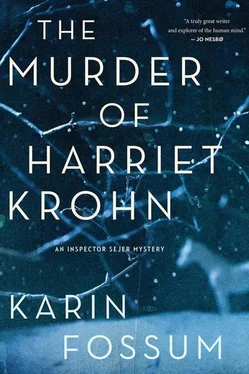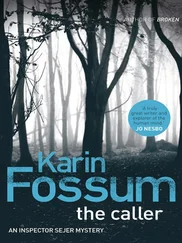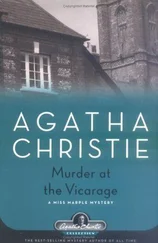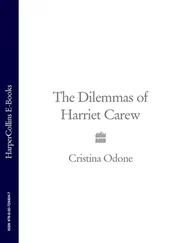Suddenly she looks tormented.
“It’s just that I’m so scared. I find bits of old jewelry in your chest, and I don’t know where they come from. And today, you’re picked up by the police. I don’t know what to think.”
Charlo gives her a horrified look.
“But,” he exclaims, “are you sitting there worrying about me, my darling?”
She makes no reply, only stares at him.
“I’ve told you what that was all about, Julie.”
He pushes his plate away and summons all his powers of persuasion.
“What is it that you’re scared of really?” he asks.
She squirms slightly, feeling awkward.
“I’m scared you’ll get caught up in something.”
Charlo grins.
“There. But I can put your mind at ease. Now listen to me. This is important — this is something you’ve got to believe. For the first time in my life, I’m in control. For the first time in a long time, I’m doing things right.” He clutches his glass and gulps at his Coke. “I’ve kicked my bad habits. I’m working hard for Møller. I’m looking after you and managing fine. The last thing I want is for you to start worrying about me. Because now I’m really on top of it all. And God knows that I’ve wasted half my life in madness and bad habits. But I’ve thrown all that off. I’m the world’s most respectable man now. I don’t fiddle with my taxes, I don’t drink, I’m not violent. But I understand that you find that hard to believe because you’re not used to it. You’re used to looking for relapses. But there’s no more backsliding. I’ve finished with that. D’you understand?”
She lifts her head and looks at him, giving him a shamefaced smile.
“Sorry,” she says faintly. “But it’s all a bit much for me. The way you suddenly turn up with everything ironed out, just like that. Paid your debts and bought me a horse. It’s almost too good to be true.”
He’s sitting with both his hands wrapped around his glass, and now he assumes a sympathetic expression. He’s lying, lying through his teeth. He’s laying it on with a trowel, and it’s as easy as winking. He thanks God for his special talent for dissimulation. People have to feign things or they wouldn’t survive, and he’s good at it because he has to be. She relaxes once more. She sighs heavily and shakes her head.
“Grandma’s very old,” he says softly. “She’s lost the thread completely.”
“I know,” says Julie.
“She still thinks I’m twenty-two. She still believes that Mom’s alive.”
“Yes.”
“Old people are so frightened,” he explains. “And fear creates confusion.”
“But occasionally her mind is crystal clear.”
“For a few short moments. But you mustn’t be taken in. Did she recognize you right away?”
“Not until I said something.”
“There. That’s what I mean. She recognizes voices. Have I managed to put your mind at rest? Tell me.”
She smiles bravely, looking ashamed.
“It’s only because I’m scared,” she says. “I’m scared of losing what I’ve finally got.”
He looks at her hard. “That’s never going to happen!” he says, wringing his hands in his lap all the while. He feels like a bull charging toward a cliff. He’s running straight ahead, refusing to look to the side, running as far as he can. They sit there for a long time, fingering their glasses.
Gradually she’s comforted by his assurances. She leans on him trustingly once more and concentrates on the present. On all the work that must be done. She receives his support and help and comfort, and she begins to believe that it will last.
Time passes and nothing happens. Charlo hears no more from the police. But he looks over his shoulder continually and trawls through all the papers for any news. Peace slowly returns to his life. He knows what he has to do hour by hour, and the days pass rapidly. He gets fitter. He lifts and carries and toils. The blood pumps through his body. He’s always so warm, so strong. He eats well and sleeps well. His nights are dreamless or, rather, he can’t remember his dreams at all. He wakes with a sense of bewilderment at the fact that he’s been given yet another day. That it’s lying there before him to do with as he pleases. That he’s still a free man. He’s managing financially and he has no expensive tastes. He buys food and a little tobacco now and then, and no longer drinks. This is how things should be forever, he thinks. Julie and me together. Hard work and harmony. He’s out of the shadows now. His turn has come at last.
In March, Julie takes part in her first competition with Crazy. She enters Intermediate B and comes in second. Charlo is in the stand with tears in his eyes. He’s so proud he almost bursts out of his shirt. She rides in white tie and tails, with a small black top hat and white gloves. She has braided Crazy’s mane and sprayed him with coat shine. None of the other horses glow like he does. This was what we were aiming for, Charlo thinks. We deserve this. But sometimes he gets irritated because his sight falters. Everything gradually goes hazy, or he starts seeing double. Then he has to blink a few times, and after a while his sight returns to normal. Oh well, he thinks. Maybe it’s time for glasses. Everyone has them, even small children. So why should I be any different? Time is passing and I’m gradually deteriorating. It doesn’t feel frightening, just a little irksome.
Eventually he gets around to booking an appointment with an optician. Arrives at the appointed time, sits down, and does everything he’s told. The optician is a young woman. She’s sitting on a chair with wheels and comes right up close, into his lap. She is so incredibly near that he can smell the scent of her skin. He begins reading from the board. But today his sight is fine. He can see everything quite clearly. He’s annoyed and relieved at the same time.
“It comes and goes,” he explains.
“Yes,” she says, pushing her chair back again, “sight is often variable from day to day, or hour to hour. That’s completely normal. But as things stand, I don’t think you need glasses.”
He looks at her and steels himself. “But apart from that,” he asks, “do my eyes look normal?”
She hesitates. “Do they look normal? Yes, I would have said so. Are you unhappy about them?”
She sends him a bemused smile. He laughs it off and shakes his head. He leaves and feels relieved. Presumably it’s nerves, he thinks. I’ve begun listening to my body in a different way now.
He’s sitting at the kitchen table distractedly fiddling with a pepper mill. He’s keeping an eye on the traffic outside to see if anyone comes. On a sudden whim, he unscrews the top of the mill and shakes the peppercorns out onto the table. They’re as brown and dry as mouse shit and scatter in all directions. He gathers them into a little pile. He thinks back over his life and all the things he’s done. Suppose these peppercorns stand for his deeds, both the bad and the good, and that there were some scales on the table. Could he get them to balance? He thinks of the years with Inga Lill, of the time when he was in control. Of the time when he could support her, when he still had a job. Aren’t those years worth a few peppercorns? He counts out ten and places them in an imaginary scale on the left, for the good things. Then there was the embezzlement at work. It wasn’t a large amount, but he’s forced to place ten peppercorns on the right, for the bad deeds. He stops for a moment and considers. His big deceit with Julie, gambling her money away, was unpardonable, and must be worth ten peppercorns. The scales are out of balance already. But then he remembers that he’s just bought her a horse. Pleased, he places ten peppercorns on the left. That looks better. But the worst thing of all remains. The murder, how much does that weigh? Is thirty enough? Forty?
Читать дальше












